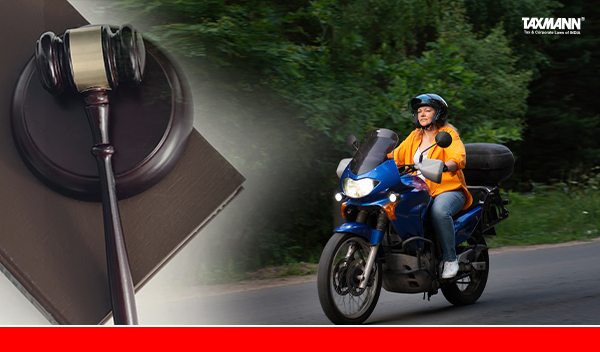[Opinion] A Correlation of ‘Compensation’ Under the Motor Vehicle Act to Income Disclosed in ITR
- News|Blog|Income Tax|
- 3 Min Read
- By Taxmann
- |
- Last Updated on 13 March, 2024

CA Srinivasan Anand G. – [2024] 160 taxmann.com 266 (Article)
Introduction
The family members of the deceased in road accidents are entitled to compensation under the Motor Vehicle Act, which is determined based on various factors, including the income of the deceased. In this article, the author discusses a recent Supreme Court judgement [Vethambal and Others v The Oriental Insurance Company and Others (Judgement dated 06.03.2024 in Civil Appeal No. 3482 of 2024)] that highlights the importance of the income tax returns (ITR) of the deceased in filing compensation claims to the Motor Accidents Claims Tribunal by his family members.
Facts of the case
The deceased was a ‘multi-tasker ‘ who did multiple economic activities, such as banana farming and sale, dairy and coconut business, and government contractor to support his family. He did not have a regular 9.00 to 5.00 job. He was killed in a road accident when he was riding a motorcycle and was hit by a negligently driven motorcycle coming from the opposite side. It was established by FIR and Police investigation that the deceased was not at fault, and the other motorcycle rider was entirely at fault. The other motorcycle rider had third-party insurance coverage from The Oriental Insurance Company. The family members of the deceased filed a compensation claim of Rs. 1 crore against the insurance company with Motor Accident Claims Tribunal cum Additional District and Sessions Judge, Tirunelveli.
Tribunal’s award of compensation
The Tribunal, upon consideration of both oral and documentary evidence, came to the conclusion that the driver of the offending vehicle is responsible for the accident and awarded a compensation of Rs. 51,64,550 together with interest at 8% p.a. The compensation was awarded considering the income of the deceased at Rs. 50,000 per month. Aggrieved by the Tribunal’s award, the insurance company filed an appeal to the Madras High Court, Madurai Bench. On the insurance company’s appeal, the Madras High Court reduced the compensation awarded by the Tribunal.
The learned counsel for the appellant insurance company stated that the deceased is said to be a Government Contractor who admittedly has not filed his income tax returns for the relevant period, but the Tribunal has taken the income through contract work as Rs. 1,11,777. It is also stated that no acceptable evidence was forthcoming to prove the loss of income for running a dairy farm. The learned counsel for the appellant would further submit that the award of the Tribunal is excessive and has to be reduced. This appeal has been preferred only to challenge the quantum of compensation, and there is no dispute with regard to negligence.
With regard to quantum, the claimants examined the Headmaster of Donavoor Santhosha Vidhyalaya to establish that the deceased supplied milk from September 2011 to November 2012 and he was paid a total sum of Rs. 8,52,447. The brother of the deceased had deposed that the deceased owned farmlands and submitted the receipt for supplying bananas to the tune of Rs. 16,36,898. Exhibits would show that the lands were standing in the name of the deceased and that the deceased was a Government Contractor, and he has also registered his name with the Tamil Nadu General Sales Tax Act.
Based on the above facts, the High Court held that it would be appropriate to fix the income of the deceased at Rs.20,000 p.m. (By supplying milk Rs.8,000, by doing agricultural work Rs. 5,000 and through contract work Rs. 7,000). Based on such income, the High Court fixed compensation at Rs. 22,48,000. The High Court, however, did not disturb the rate of interest at the rate of 8% fixed by the Tribunal. Aggrieved by the High Court judgement, the respondent claimants (family members of the deceased) preferred an appeal to the Supreme Court
Click Here To Read The Full Article
Disclaimer: The content/information published on the website is only for general information of the user and shall not be construed as legal advice. While the Taxmann has exercised reasonable efforts to ensure the veracity of information/content published, Taxmann shall be under no liability in any manner whatsoever for incorrect information, if any.

Taxmann Publications has a dedicated in-house Research & Editorial Team. This team consists of a team of Chartered Accountants, Company Secretaries, and Lawyers. This team works under the guidance and supervision of editor-in-chief Mr Rakesh Bhargava.
The Research and Editorial Team is responsible for developing reliable and accurate content for the readers. The team follows the six-sigma approach to achieve the benchmark of zero error in its publications and research platforms. The team ensures that the following publication guidelines are thoroughly followed while developing the content:
- The statutory material is obtained only from the authorized and reliable sources
- All the latest developments in the judicial and legislative fields are covered
- Prepare the analytical write-ups on current, controversial, and important issues to help the readers to understand the concept and its implications
- Every content published by Taxmann is complete, accurate and lucid
- All evidence-based statements are supported with proper reference to Section, Circular No., Notification No. or citations
- The golden rules of grammar, style and consistency are thoroughly followed
- Font and size that’s easy to read and remain consistent across all imprint and digital publications are applied



 CA | CS | CMA
CA | CS | CMA
